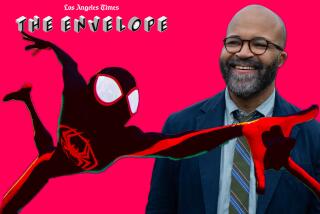Remembering Tidyman and His Work on ‘Shaft’
- Share via
As did many others in the film industry, I followed the excerpts of Gordon Parks’ autobiography, “Voices in the Mirror” (View, Dec. 6), with interest and more than a little admiration.
But somehow, in Parks’ recounting of his hit “Shaft” films--the world impact, the “romantic hero he brought to the black youth,” the “green light it gave for black suspense films” and the “disappointing rash of exploitive scripts” that followed--it would appear he misread the credits on his own films. That, or he has put his “fine screenwriter, John D.F. Black,” in the unenviable position of having apparently misrepresented himself as sole writer, while shamelessly plagiarizing the published novel “Shaft.”
A novel written anonymously? The same anonymous writer who anonymously wrote the other six “Shaft” novels, co-wrote Parks’ first “Shaft” screenplay, and was sole writer and co-producer on Parks’ second “Shaft” film.
This same anonymous gentleman was also at the Academy Awards the night Parks proudly watched Isaac Hayes win for best song and become the first black composer to win an Academy Award. Amazing that Parks didn’t notice his ghost cohort, Ernest Tidyman, walk up to the stage a few minutes later to claim the award for writing “The French Connection.”
Tidyman wrote nine other novels in addition to the “Shaft” series as well as such films as “High Plains Drifter” and “Force of One” and such television movies and miniseries as “To Kill a Cop,” “Dummy” and “Guyana Tragedy: The Jim Jones Story.” He picked up numerous awards and nominations along the way, including the NAACP Image Award--for “Shaft.”
Tidyman’s true skill was an ability to define the hero and the bad guys without ever allowing racism to bump into itself. Everyone, black and white, was rooting for Shaft, the hero. The fact that he was black had nothing to do with it . . . and, of course, everything to do with it. Blacks and whites could root side by side, but in Shaft territory it was always going to be hipper to be black. And, you have to admit, it was great fun to see whites leaning in to watch and listen, suddenly hungry to imitate a race they were so vigorously suppressing.
In my all too brief association with Ernest Tidyman, I quickly saw that he would be neither baited nor bullied into any arguments re: Shaft vs. Black Exploitation Films. He felt that the character Shaft should stand on its own merit, which it well did. In fact, Ernest Tidyman’s body of work also stands on its own merit, and the last thing he would need is anyone to presume to defend him. I’m certain his position on this did not change with his untimely death in 1984--but he’s just going to have to bite the bullet on this one.
Parks is, deservedly, a respected figure in many fields and young blacks in the film industry look to him for the wisdom and insight his vast experience and multiple talents have brought him.
But the next time he hears “voices in the mirror,” I hope he never fails to acknowledge those who worked with him. I hope he chooses to counsel young blacks to be as wise as he so obviously was in ignoring skin color when selecting creative talent. You have to admit that one could do a lot worse than having an Ernest Tidyman riding shotgun on your project.
More to Read
Only good movies
Get the Indie Focus newsletter, Mark Olsen's weekly guide to the world of cinema.
You may occasionally receive promotional content from the Los Angeles Times.








